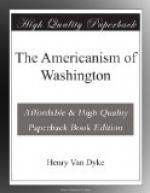It is true, of course, that the fortune which he so willingly imperilled and impaired recouped itself again after peace was established, and his industry and wisdom made him once more a rich man for those days. But what injustice was there in that? It is both natural and right that men who have risked their all to secure for the country at large what they could have secured for themselves by other means, should share in the general prosperity attendant upon the success of their efforts and sacrifices for the common good.
I am sick of the shallow judgment that ranks the worth of a man by his poverty or by his wealth at death. Many a selfish speculator dies poor. Many an unselfish patriot dies prosperous. It is not the possession of the dollar that cankers the soul, it is the worship of it. The true test of a man is this: Has he labored for his own interest, or for the general welfare? Has he earned his money fairly or unfairly? Does he use it greedily or generously? What does it mean to him, a personal advantage over his fellow-men, or a personal opportunity of serving them?
There are a hundred other points in Washington’s career in which the same supremacy of character, magnanimity focussed on service to an ideal, is revealed in conduct. I see it in the wisdom with which he, a son of the South, chose most of his generals from the North, that he might secure immediate efficiency and unity in the army. I see it in the generosity with which he praised the achievements of his associates, disregarding jealous rivalries, and ever willing to share the credit of victory as he was to bear the burden of defeat. I see it in the patience with which he suffered his fame to be imperilled for the moment by reverses and retreats, if only he might the more surely guard the frail hope of ultimate victory for his country. I see it in the quiet dignity with which he faced the Conway Cabal, not anxious to defend his own reputation and secure his own power, but nobly resolute to save the army from being crippled and the cause of liberty from being wrecked. I see it in the splendid self-forgetfulness which cleansed his mind of all temptation to take personal revenge upon those who had sought to injure him in that base intrigue. I read it in his letter of consolation and encouragement to the wretched Gates after the defeat at Camden. I hear the prolonged reechoing music of it in his letter to General Knox in 1798, in regard to military appointments, declaring his wish to “avoid feuds with those who are embarked in the same general enterprise with myself.”
Listen to the same spirit as it speaks in his circular address to the governors of the different States, urging them to “forget their local prejudices and policies; to make those mutual concessions which are requisite to the general prosperity, and in some instances to sacrifice their individual advantages to the interest of the community.” Watch how it guides him unerringly through the critical period of American history which lies between the success of the Revolution and the establishment of the nation, enabling him to avoid the pitfalls of sectional and partisan strife, and to use his great influence with the people in leading them out of the confusion of a weak confederacy into the strength of an indissoluble union of sovereign States.




